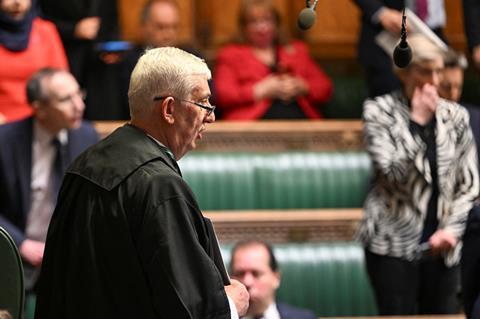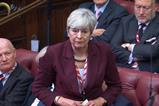This week’s Westminster meltdown was a seriously bad look for Britain, and damaging for our democracy, says James Mildred. Vital issues are at stake, and we need our leaders to model convicted civility.

What happened in the House of Commons during the afternoon of 21 February has been met with understandable shock and disappointment. I suspect even if you’re not especially interested in politics, you’ll have picked up that something went on. Many of us are probably a bit confused about what exactly took place.
What happened?
Here’s a brief explanation. Wednesday was an opposition day. That means an opposition party has the chance to table a motion for debate. Its purpose is to give space for a non-governing party to raise issues and put pressure on the government of the day. So, the Scottish National Party (SNP) decided to use their allotted time to hold a debate on a motion calling for an immediate ceasefire in Gaza.
In response, Labour tabled an amendment to the SNP motion, calling for a humanitarian ceasefire. This was politically sensitive for the Labour Leadership and especially Keir Starmer. Back in November last year, when a similar debate was held, 56 Labour MPs rebelled against Starmer’s authority by voting for a previous SNP amendments calling for a ceasefire. This included some shadow cabinet ministers who resigned. Understandably keen to keep his party together ahead of the upcoming election, the Labour amendment took a tougher line than previously, by calling for a ‘humanitarian ceasefire’, although this stopped short of going as far as the SNP’s position of an ‘immediate ceasefire’.
The Government also tabled an amendment to the motion calling for a humanitarian pause to allow for more aid to get into Gaza.
Now, here’s the crucial bit. The Speaker of the House of Commons, Sir Lindsay Hoyle, selects which amendments to the motion being debated will go to a vote. The historic convention is that the Speaker only selects the government amendment to the opposition party’s motion. Had Hoyle done this, it would have meant Labour MPs facing an unpalatable choice between abstaining, or supporting the government and it would have emboldened some, no doubt, to rebel again, just as 56 did last November.
In the Christian worldview, courage and conviction must be married to civility
But Hoyle chose to break this precedent by selecting both the Labour Party amendment and the Government’s amendment. To be clear: this wasn’t the Speaker re-writing the rules of parliament. Convention/precedent is different from rules and Hoyle was within his rights, technically, to act as he did. But it was highly unorthodox, reminiscent of the days of Brexit votes and parliamentary shenanigans.
Many MPs were furious - especially SNP MPs. Its Westminster leader Stephen Flynn even led a walkout of the Party from the Commons, and many Tory MPs left the Chamber as well. Amidst the chaos, the government actually withdrew its amendment and said it would take no further part in the debate. The end result was that Labour’s motion actually passed without needing a vote.
Following the vote, an Early Day Motion has been tabled by Conservative MP Will Wragg that says: “That this House has no Confidence in Mr Speaker”. 1 in 10 MPs have signed the motion of no confidence, meaning the Speaker’s position is in the balance.
What does it mean?
Firstly, the debate was bad for the Speaker. Sir Lindsay Hoyle is a respectable figure, liked by MPs all across the Commons. His actions have damaged his reputation and standing. It remains to be seen if he’ll survive. To his credit, he returned to the Commons and apologised, taking some responsibility for the chaos. In a society where there is little to no place for forgiveness, Christians can be distinct by accepting his apology and showing both grace and a willingness to forgive in response.
From a Christian perspective, a fair, impartial Speaker who is not dictated to by pressure groups matters. His role is mission critical in the success of parliament, which is the centre of democracy in our land. Good government is an institution ordained by God (Romans 13) and is most likely in the context of a healthy parliament.
Secondly, the debate was bad for MPs. The issue being debated is of huge international importance. MPs should have been debating what is happening in Gaza with a seriousness and a gravity that is consistent with the awful, tragic scale of human suffering that is taking place. It was unseemly that a debate on this issue became so disrupted by a Westminster meltdown over parliamentary process. As was pointed out, Israel is still suffering from the brutal terrorist attack in October last year. Hostages remain unreleased. In Gaza, close to 30,000 lives are thought to have been lost, including innocent children.
As followers of Jesus, we should care about suffering. Whatever our views on the conflict in the Middle East, we should lament the tragedy of war, suffering, death and ruin. We should pray for both justice and peace. Politics must serve the needs of people, made in God’s image (Genesis 1:26-28), rather than being about cheap political point scoring. At CARE, we’re for people before parties, politics and personalities. When the Commons should have been at its finest, it showed us its very worst. We should bemoan the fact that our politics is in such a state
Finally, the debate was bad for democracy. When he finally came back to the chamber, Hoyle explained that he chose all three options in part to allay security fears. As one commentator pointed out in the aftermath, if we have reached a point where precedents are being broken because we are afraid for the safety of our MPs, something has gone badly wrong in our nation. The real danger is the moment you break convention once, it becomes easier to keep breaking it. And to do it because of threats of violence is deeply disturbing.
In the Christian worldview, courage and conviction must be married to civility. Sadly both were regrettably absent from the debate yesterday. We need grace and truth, which Jesus modelled to us: “He came from the Father, full of grace and truth.” (John 1:14) This convicted civility permits strong views, but guards against needless hurt.
We need to see politics renewed and lives transformed. At its best, politics helps save and improve lives. For me, it’s a vision still worth pursuing.






































2 Readers' comments